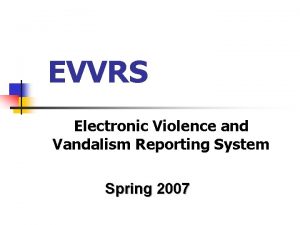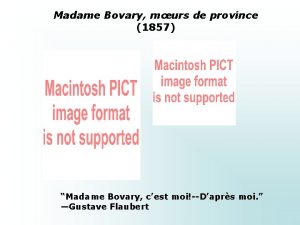Madame Quann Role of the Homeroom Teacher Primary
















- Slides: 16

Madame Quann

Role of the Homeroom Teacher Primary contact Notes (or e-mails required for absence & date/s) Arrival Times Doors open at 7: 45; first bell at 8: 00 (If late, or leaving early, student must check at the office. If you are not coming in to sign them in, you should send a note to ensure they are marked late excused or absent excused). Home-School Interaction Importance of continued involvement in your child’s education. Use of Power School to keep parents informed of attendance, behaviour and marks. You will all be given account user names and passwords. Check homework page and website. Updated regularly. Electronic Policy Cell phone use in the classroom can be a distraction to learning. Students are not permitted to text or receive texts in class. If taken, the cell phone will be turned into office and a parent must come in to pick up. There will be times students may be given permission to use their cell phones. Care of School Property Students will be issued textbooks. If they are lost or destroyed, students will be charged the cost of the book.

Academic Expectations Homework. Teachers will be posting homework. Classroom work. Cooperation and attention Principals list: 90% in ALL subjects Honors: 80% in ALL subjects Evaluation Exams in June (English, Math & Science) No final exams in Social Studies, Français Religion, or Health Three reporting periods (December, March, June) Traffic Flow Speed limit, 10 km/h Enter off Toronto St. , using upper entrance and proceed around the back of the school to get to front of school. Students should be dropped off at student entrance and not before 8: 05. No parking in bus lanes; note lanes and arrows in parking lot

Teacher: Mme Colette Quann Telephone: 753 -8240 E-mail: colettequann@nlesd. ca Blog: colettequann. wordpress. com

On the school’s web site, click on “Homework Pages” and then your child’s homeroom number to check homework assigned in each course. You also have the option of clicking on a specific teacher’s name for access to their web page. I use my web page to post useful links, copies of notes, worksheets, projects, and study guides. I may also use my homework page to highlight any announcements or special information.

MDJH Webpage (from the MDJH webpage, click HOMEWORK. On the right, look through list of teachers, find Colette Quann and click on the word website to open my website. ) Mme. Quann's website

Ressources Littératie en action 5 Romans – 2 (Alexa Gougougaga, Intrigues à St. John’s) Pièce de théâtre – Éric a disparu Dictionnaire anglais – français (Larousse / Merriam-Webster’s) * Livre des verbs (L’art de conjuguer – Bescherelle / The Big Blue Book of French Verbs)* Matériel Classeur Feuilles mobiles Feuilles intercalaires Cahier pour la lecture Duotangs Crayons, stylos noirs / bleus, crayons colorés

Assessment and Evaluation Plan The teaching of Français 7ème will reflect the development and evaluation of four skills. Each of the four skills will be evaluated equally which include: Listening comprehension Oral production Reading comprehension Written production 25% 25%

Term work will be evaluated through a continuous evaluation process and a variety of evaluation techniques covering all four skills. Each skill shall be evaluated in a variety of ways: Formal and informal observations Work samples Portfolios Oral presentations Discussions Cooperative group work Rubrics Songs, poetry , dialogues , role playing Essays Illustrations Oral interviews Quizzes/unit tests

Student Text: Un monde en changement (there will be many handouts given to supplement the text) Materials : 1 ½ inch binder Looseleaf and exercise books, pencils and pens French/English dictionary

Themes: Unit 1: Introduction Unit 2: Economic Empowerment Unit 3: Political Empowerment Unit 4: Cultural Empowerment Unit 5: Societal Empowerment Unit 6: National Empowerment Unit 7: Summative

Unit Unit 1: 2: 3: 4: 5: 6: 7: Introduction Economic Empowerment Political Empowerment Cultural Empowerment Societal Empowerment National Empowerment Summative 5% 16% 21% 16% 5%

Performance Assessment - Assignments - Class Activities (The difference in an assignment and a class activity is in the time it takes to complete. A class activity is something that can be done in one class while an assignment may be a task done at home or over 2 -3 classes) Tests Quizzes NO FINAL EXAM Grade 7 Curriculum Guide

1) 2) 3) 4) 5) 6) Spiritual Expressions – 22% Exploring Sacred Texts – 17% Spiritual Roots – 22% Personal Search and Commitment – 17% Creation and You – 17% Religion: A Contemporary Focus – 5%

Units (Categories in Gradebook) Unit 1: Content, Process, and Skills An Overview Unit 2: Emotional and Social Well. Being Unit 3: Human Sexuality Weightings Unit 4: Relationships 8% Unit 5: Smoking and Alcohol 20% Unit 6: Active Living 15% Unit 7: Safety and Environmental Health 15% 3% 17% 22%

 Mrs quann
Mrs quann Ssds nj homeroom
Ssds nj homeroom West cabarrus high school open house
West cabarrus high school open house Homeroom expectations
Homeroom expectations Homeroom expectations
Homeroom expectations Homeroom.state.nj.us
Homeroom.state.nj.us Pastel pompadour
Pastel pompadour Jean baptiste grenouille real story
Jean baptiste grenouille real story Oui je suis bien
Oui je suis bien Bom dia madame
Bom dia madame Madame curie paul langevin
Madame curie paul langevin Madame tussauds around the world
Madame tussauds around the world Madame de florian
Madame de florian Madame c.j. walker produits
Madame c.j. walker produits Madame bovary obnova
Madame bovary obnova Suite madame blue meaning
Suite madame blue meaning Suite madame blue meaning
Suite madame blue meaning





























